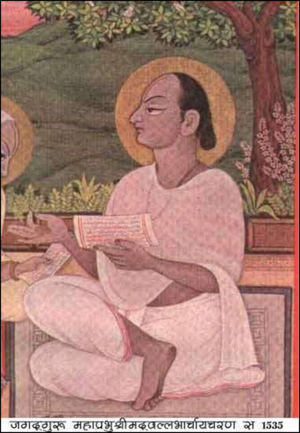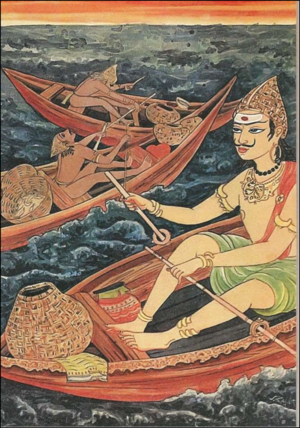Talk:Īshvarārpaṇa - Everything belongs to Bhagavān and they are merely caretakers
By Vishal Agarwal
The Bhakta Yogī does not have a sense of ‘mine’, ‘I’ because he has surrendered himself, and everything that he owns to the Lord and merely acts as a caretaker of whatever he has. For this reason, in Gita 12.13, Krishna says of his ideal devotees that they are ‘nirmama’ (free from the sense of ‘mine’), nirahaṃkāraḥ’ (free from the sense of ego) and in verse 12.19, he is said to be ‘aniketaḥ’ or ‘without a worldly dwelling’ because such a perfect Bhakta always dwells at the lotus feet of the Lord.
An example is given in the Mahābhārata –
King Uparichara had dedicated his kingdom, wealth, wife and vehicle etc., to the Lord, believing them to be Divine possessions. Mahābhārata 12.335.23
The Bhakti Yogī considers it a very profitable bargain to dedicate himself and everything that he has to the Lord. As the Tamil Hindu saint Manichavasagar[1] says in a hymn-
I gave myself to You, Lord, and in return You gave Yourself to me. Who is gaining? With me, You are not gaining anything – because I am just a useless entity, not capable of doing anything. I will be a burden to You, just one more stomach to be fed. But with You, I can do many things. If I have You, I have gained everything in this world. So, You see, though You call it a fair business deal, You are really losing.”
The stories below illustrate the complete dedication of all possessions and their entire being to the Lord.
Sant Vallabhāchārya Fasts Till the Pawned Temple Saucer is Retrieved
Shri Mahaprabhu Vallabhacharya (1479-1531 CE) was a great devotee of Krishna. One day, while in Vrindavan, he learned that the Krishna temple did not have enough money for food to offer to the Deity. The Vallabhacharya ordered that the gold saucer of the temple be pawned to get the required amount. But when food was purchased with the money and offered to Krishna’s mūrti, Vallabhacharya refused to accept even one morsel of the prasāda.
Till a devotee did not donate enough money and the temple did not restore the pawned the gold saucer, Vallabhacharya did not eat anything.
Finally, when he ate food for the first time in two days, he called and his devotees and explained to them the cause of his fasting with tears in his eyes, “The gold saucer belonged only to Bhagavan. We had no right to pawn an item that already belonged to Him, and then consume the food purchased with that money. For this reason, I felt guilty and did not eat any of the food offered to Krishna as prasāda, because that would mean stealing from Him. Now that the saucer is restored to Krishna, I can eat the prasāda.[2]”
Story: Fisherman Sant Atipathar Gives his Treasure Catch to Shiva
Sant Atipathar was a fisherman in Tamil Nadu. He had made a vow to offer the first fish he caught during every trip into the ocean. Unfortunately, it so happened that Atipathar did not catch a single fish for several days. He was poor, and hungry. Suddenly, he caught a magical fish in his net. The fish was encrusted with precious gems. But Atipathar kept his promise to Shiva, and immediately released it back as an offer to Him. Bhagavān Shiva was so pleased with his Bhakta, that He appeared in front of him and granted him Moksha[3].
References[edit]
- ↑ Quoted in Krishnaswami, O. R. Open Your Heart to God Through Bhakti Yog – Yog of Devotion. Dev Publishers & Distributors, 2014, p. 115. New Delhi.
- ↑ Chaitanya, Devendra, and Sudarshan Singh Chakra. Drishtaanta Mahaasaagar (in Hindi). Randhir Prakashan, 2013, p. 512. Haridwar.
- ↑ Nandakumar, Prema. Saints of Saivism. Sri Ramakrishna Math, 2013, p. 194. Mylapore, Chennai.


